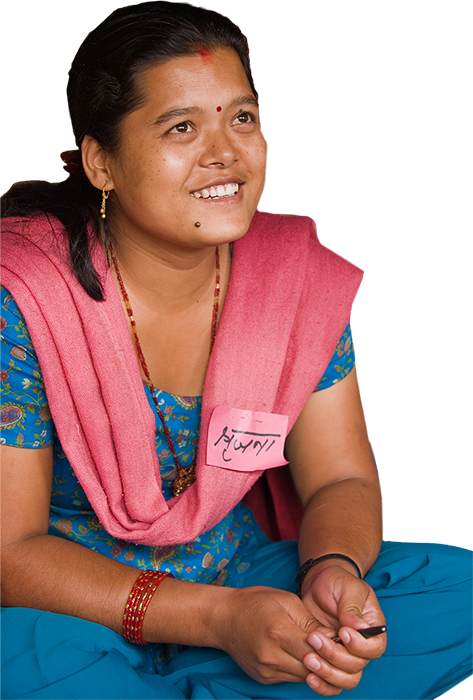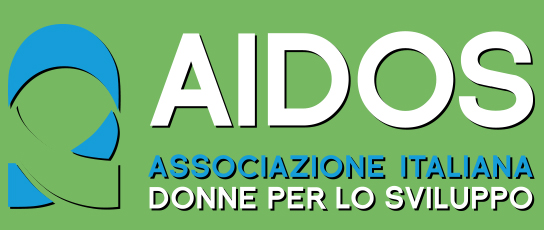
AIDOS
Associazione italiana donne per lo sviluppo
AIDOS begins its journey in 1981, with the establishment of the Italian Association for Women in Development (AIDOS) as a women’s association and non- governmental development organisation. AIDOS was recognised in 1992 by the Ministry of Foreign Affairs as eligible to manage public funds for the implementation of international development projects. Since its establishment, AIDOS has worked in developing countries, Italy and internationally to build, promote and defend the rights, dignity and freedom of choice of women and girls. AIDOS works in partnership with local organisations and institutions to provide tools to women and their organisations, particularly in those areas where the experience of the Italian feminist movement has yielded significant results. These areas are: a) women’s rights, as an integral and necessary part of the development process; b) sexual and reproductive health and rights (SRHR); c) economic empowerment of women; d) the education of girls. AIDOS’ approach is based on a continuous and equal dialogue with women’s and non-governmental organisations worldwide, and with associations and people engaged with human rights, women’s and LGBTQI rights. has a special consultative status the Economic and Social Council of the United Nations (ECOSOC) and is implementing partner of the United Nations Population Fund (UNFPA) and the United Nations High Commissioner for Refugees (UNHCR) in Italy.
How we work
AIDOS’ approach means first of all the strengthening of the technical, managerial and organisational skills and capacities of partner organisations and individuals in all projects.
All resources are used to support local project partners through specific training, technical assistance, and monitoring and evaluation visits based on needs identified during the design and the implementation of the activities.
For this reason, AIDOS’ approach ensures project sustainability and continuation after donors’ phase-out and project formal completion.
AIDOS can rely on a pool of experienced and strongly motivated international consultants to provide technical assistance and monitoring, including gynaecologists, psychologists, economists, communication and advocacy experts, who make their skills and experience available in support of women and the most marginalised communities.
AIDOS also recognises the crucial importance of consultancies and trainings on management skills, as well as financial monitoring, managed directly by AIDOS administrative team.
Our mission
AIDOS teams up with partner organisations in different countries to jointly build projects and develop shared strategies to address the specific needs of women and girls. AIDOS is also part of many national and international networks of organisations.
All our activities aim at creating structural conditions that nurture a sustainable development. Our campaigns raise awareness on women’s rights and promote the empowerment of women and of their communities.
However, solving a specific problem in a given community is not enough. That is why AIDOS is committed to positively influence government policies to improve the living conditions of all women, and the population of a concerned country. For this reason, all AIDOS projects also include information and advocacy activities.
Members
Members are at the very core of AIDOS. The essential requirement to be a member is to share our mission for professional, social, political or personal reasons. To become a member, simply send a written request to the Board of Directors, indicating your name, contact details and reasons with a brief note on your profession and interests. The annual membership fee is € 50.
Board of Directors
Every three years the Annual Members’ Assembly appoints the Board of Directors, which is formed by the President, the Vice-President, and a number of counsellors. The current Board of Directors members are:
President
Maria Grazia Panunzi, Historian
Vice-President
Serena Fiorletta, Anthropologist
Counsellors
Cristina Angelini, Psychologist
Eleonora Cirant, Anthropologist
Antonietta Cilumbriello, Gynaecologist
Maria Enrichetta Drago, Lawyer
Valentina Fanelli, Expert in sociology of communication
Giuseppina Forte, Architect
Valentina Sommacal, Female entrepreneurship expert
Auditor
Gemma Ponti
Aidos: our team
Staff: AIDOS projects and campaigns are possible thanks to the commitment of those who ensure the continuity and the efficiency of the work of the association.
Licia Bernardi
Administration manager
Mariarosaria Lima
AIDOS Project Coordinator in Jordan
Maria Grazia Panunzi
President
Stefania Burbo
Advocacy Officer
Giovanna Ermini
Documentation Center manager
Barbara Romagnoli
Media officer
Clara Caldera
Program officer
Serena Fiorletta
Communication and Press Office Manager
Manal Tahtamouni
Gynaecologist. AIDOS Representative in Jordan
Paola Cirillo
Program Officer
Beatrice Mariottini
Advocay Officer
Graziella Zidda
Accountant
… And, of course, our field staff and expert consultants who collaborate from many different places!
Sebastian Alcala Torres
Product development expert
Stefania Chirizzi
Expert in monitoring and evaluation
Francesca De Masi
Sociologist
Edoardo Pera
Psychologist
Monica Pasquino
Educator
Cristina Angelini
Psychologist
Andrea Cocco
Journalist
Francesco Di Pietro
Lawyer
Marco Simonelli
Anthropologist
Carla Quinto
Lawyer
Maria Giustina Campagna
Chef
Letizia Cucchiella
Chef
Chiara Giordano
Training modules consultant
Valentina Sommacal
Development expert
Adele Tulli
Videomaker
Rossella Carnevali
Psychiatrist
Paola Castelli Gattinara
Psychologist
Barbara Lilliu
Chef
Andrea Iannetta
Videomaker
Albarosa Zoffoli
Videomaker
AIDOS partner:
- Actions, Mauritania
- AKIDWA, Irlanda
- AMWIK – Association of Media Women in Kenya, Kenya
- AMSOPT – Association Malienne pour l’Orientation et le Suivi des Pratiques Traditionnelles, Mali
- ARCS – Arci Culture Solidali, Italia
- ARCI, Italia
- APF – Associaçao para Planeamento Familiar, Portogallo
- ASD, Guinea
- Caritas, Italia
- CISV, Italia
- Coventry University, Regno Unito
- CRWI – Centre for Research on Women’s Issues Diotima, Grecia
- End FGM Network, Belgio
- Cyprus University of Technology, Cipro
- EquiPop – Equilibres & Populations, Francia
- Excision, parlons-en!, Francia
- FNGN Fédération Nationale des Groupements Naam, Burkina Faso
- FORWARD, Regno Unito
- FPFE – Federacion de Planificacion Familiar Estatal, Spagna
- FSAN – Federatie van somalo Associates Nederland, Paesi Bassi
- GAMS Belgique – Groupe femmes pour l’Abolition des Mutilations Sexuelles, Belgio
- GVC – Gruppo di Volontariato Civile, Italia
- INTACT, Belgio
- JED – Jeunesse Et Développement, Senegal
- Keoogo, Burkina Faso
- LVIA, Italia
- Medicos del Mundo, Spagna
- MIGS – Mediterranean Institute of Gender Studies, Cipro
- MPDL – Movimiento por la paz, Spagna
- Mwangaza Action, Burkina Faso
- NCFA – National Council for Family Affairs, Giordania
- Network Italiano Salute Globale
- NHF – IFH Noor al Hussein Foundation/Institute for Family Health, Giordania
- PARC – Agricultural Development Association, Palestina
- Phect-Nepal – Public Health Concern Trust, Nepal
- Plan International, Mali
- PWHO – Palestinian Women’s Humanitarian Organization, Libano
- RC – Ricerca e Cooperazione, Italia
- Stiftung Hilfe mit Plan, Germania
- TERRE DES FEMMES, Germania
- Tiljala Shed – Tiljala Society for Human & Educational Development, India
- TOSTAN, Senegal
- UMWA – Uganda Media Women’s Association, Uganda
- UNHCR Italia – Alto Commissariato delle Nazioni Unite per i Rifugiati, Italia
- WISE – Women In Self Employment, Etiopia
- WRF – Women’s Rights Foundation, Malta
- FAO, Organizzazione per l’alimentazione e l’agricoltura delle Nazioni Unite
- IFAD, Fondo internazionale per lo sviluppo agricolo delle Nazioni Unite
- OIL, Organizzazione Internazionale del Lavoro
- TAVOLA VALDESE – Ufficio otto per mille
- UNFPA, Fondo delle Nazioni Unite per la popolazione
- UNICEF, Fondo delle Nazioni Unite per l’infanzia
- UNIDO, Organizzazione delle Nazioni Unite per lo Sviluppo Industriale
- UN Women, Agenzia delle Nazioni Unite per le donne
- WORLD BANK, Banca Mondiale
Network di cui AIDOS fa parte:
- AOI, Associazione Ong Italiane – Cooperazione e solidarietà internazionale
- ASVIS, Alleanza per lo Sviluppo Sostenibile
- CONCORD Italia, Network delle ONG in Europa per lo sviluppo e l’emergenza
- EndFGM, European network
- INSPIRE European Partnership for Sexual and Reproductive Health and Rights
- GCAP Italia, Coalizione Italiana contro la Povertà
- Girls Not Brides
- In Difesa Di – per diritti umani e chi li difende
- ISRRC, International Sexual and Reproductive Rights Coalition
- Network Italiano Salute Globale
- PIDIDA, Coordinamento per i diritti dell’infanzia e dell’adolescenza
In passato AIDOS ha lavorato con:
AAI Italia, Milano, Italia; Action Aid International, Londra, Regno Unito; ADUSU, Associazione diritti umani sviluppo umano, Padova, Italia; AID, Association for Integrated Development, Bosaso, Somalia; ALAPLAF, Asociación Larense de Planificación Familiar, Barquisimeto, Stato Lara, Venezuela; ASTRA, Federation for Women and Family Planning, Varsavia, Polonia; AVESA, Asociación Venezolana para una Educación Sexual Alternativa; BAFROW, Foundation for Research on Women’s Health, Productivity and Environment, Banjul, Gambia; BBSAWS, Babiker Badri Scientific Association for Women Studies, Omdurman, Sudan; BRAC, Bangladesh Rural Advancement Committee, Dacca, Bangladesh; CCMC, Communication Consortium Media Centre, Washington, USA; CEM, Centro de Estudios de la Mujer, Buenos Aires, Argentina; CESTAS, Centro di Educazione Sanitaria e Tecnologie Appropriate Sanitarie, Bologna, Italia; CI-AF Benin, Comité Inter-Africain Benin, Portonovo, Benin; CFTA, Culture and Free Thought Association, Khan Yunis, Striscia di Gaza; CGFED, Research Centre for Gender, Family and Environment in Development, Hanoi, Vietnam; CNLPE, Centre National de Lutte à la Pratique de l’Excision, Ouagadougou, Burkina Faso; CPTAFE, Cellule de coordination sur les Pratiques Traditionnelles affectant la santé des Femmes et des Enfants, Conakry, Guinea Conakry; CRR, Centre for Reproductive Rights, New York, USA; Culture Aperte, Associazione di promozione sociale, Trieste, Italia; Data Coop, Roma, Italia; DENA, Associazione pittrici iraniane, Teheran, Iran; DSW, Deutsche Stiftung Weltbevölkerung, Hannover, Germania; ECWR, Egyptian Centre for Women’s Rights, Cairo, Egitto; EMWA, Ethiopia Media Women Association, Addis Abeba, Etiopia; ESPHP, Egyptian Society for the Prevention of Harmful Practices, Cairo, Egitto; Focus Foundation, Mosca, Russia; FPASAL, The Family Planning Association of Sri Lanka, Colombo, Sri Lanka; GAMCOTRAP, Gambia Committee on Traditional Practices, Banjul, Gambia; HAWCA, Humanitarian Assistance for the Women and Children of Afghanistan, Quetta, Pakistan; IAC, Inter-African Committee on Traditional Pactices Affecting the Health of Women and Children, Addis Abeba, Etiopia; ICRH, International Centre for Reproductive Health, Ghent, Belgio; IRC, UNICEF Innocenti Research Centre, Firenze, Italia; IWSAW, Institute of Women’s Studies in the Arab World, Beirut, Libano; Interact Worldwide, Londra, Regno Unito; Lettera22, Associazione indipendente di giornalisti, Roma, Italia; MSI, Marie Stopes International, Londra, Regno Unito; National Centre for Social Research, Cairo, Egitto; NCCM, National Commission on Childhood and Motherhood, Cairo, Egitto; NCTPE, National Committee on Traditional Practices, Addis Abeba, Etiopia; NPWJ, Non c’è pace senza giustizia, Roma, Italia; PAI, Population Action International, Washington, USA; Population Council, New York, USA; RAINBO, Research, Action and Information Network for the Bodily Integrity of Women, New York, USA; RCS, Red Crescent Society, Gaza, Striscia di Gaza; RHAC, Reproductive Health Association of Cambodia, Phnom Penh, Cambogia; SFPA, Syrian Family Planning Association, Damasco, Siria; Shirkat Gah Women’s Resource Centre, Lahore, Pakistan; SNCTP, Sudanese National Committee on Traditional Practices, Khartoum, Sudan; SWDO, Somali Women Democratic Organisation, Mogadiscio, Somalia; TAMWA, Tanzania Media Women’s Association, Dar Es Salaam, Tanzania; TAWLA, Tanzania Women Lawyers Association, Dar Es Salaam, Tanzania; TGNP, Tanzania Gender Networking Programme, Dar Es Salaam, Tanzania; TGT Tanzania Gatsby Trust; VdF, Voix de Femmes, Ouagadougou, Burkina Faso; ZhIF, Zhenski Innovatsionnyi Found “Vostok-Zapad”, Mosca, Russia; Women’s Affairs, Training and Research Centre, Gaza City, Striscia di Gaza; Women’s Studies Centre, Amman, Giordania; WOREC, Women’s Rehabilitation Centre, Lalitpur, Nepal; WPF, World Population Foundation, Amsterdam, Paesi Bassi.
